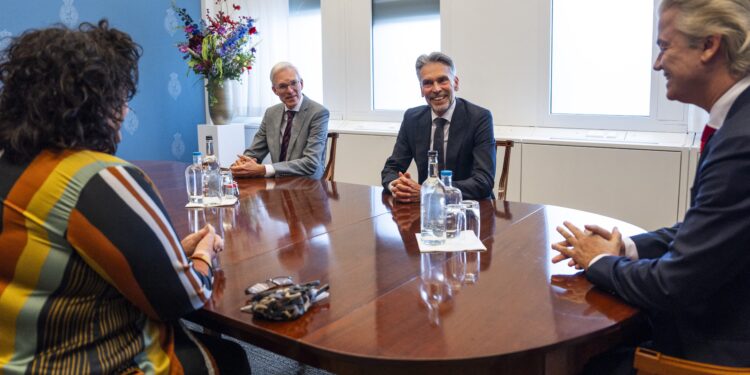Brussels – The right-wing coalition in the Netherlands is racing toward governing the country, and now, with two weeks to go before the agreement between the four forces ranging from liberals to the far right, there is also the name of the prime ministerial candidate. As reported by the Dutch broadcaster Nos, this afternoon (May 28), the current secretary general of the Ministry of Justice and Security, Dick Schoof, met with the leaders of the four parties to agree on the strategic lines of the future cabinet that he would lead.

A 67-year-old official with no political experience, Schoof has held the highest non-political position in the Ministry of Justice and Security since March 1, 2020. He previously served as director of the Immigration and Naturalization Service (from 1999 to 2003), director general of police (from 2010 to 2013), national coordinator for security and counterterrorism (from 2013 to 2018), and most importantly, director general of the National Intelligence and Security Service (from 2018 until taking up the new post). According to reports from the meeting, Schoof would have the backing of the leaders of all four political forces, namely the liberals of the People’s Party for Freedom and Democracy (VVD), the centre-right New Social Contract (NSC), the Civic-Country Movement (BBB), and the far-right anti-immigration, anti-Islamic, and strongly Euroskeptic party PVV (Party for Freedom).
“Dick Schoof has an excellent track record; he is nonpartisan and therefore above parties, he has integrity and is also very understanding,” commented on X the leader of the far-right party, Geert Wilders, anticipating the outcome of the meeting. “He is our candidate and will be prime minister for all Dutch people,” claimed the VVD leader, Dilan Yeşilgöz-Zegerius, while the leader of NSC, Pieter Omtzigt, stressed that Schoof has “a lot of relevant experience” for policy areas “that matter” in the Netherlands—a reference to migration and security. “In the unstable world we live in now, it’s good to have a prime minister who has experience,” BBB leader Caroline van der Plas reiterated. At this point, negotiations to define the team of ministers and secretaries of state will have to be pursued in the coming weeks, and it seems likely that the new government of the Netherlands will take office no earlier than early July.
What happened in the last election in the Netherlands
According to the results of the November 22, 2023 elections, the far-right PVV party recorded the most convincing electoral test in its history, becoming the first force in Parliament and claiming the leadership of the Netherlands: with 23.5 per cent of the vote, it outperformed by 8 points the coalition between the Labor Party and the Green Left GroenLinks, led by the former head for the European Green Deal in the EU Commission, Frans Timmermans. Despite the growth in votes (+4.7 per cent) compared to the last election in 2021, when the two forces ran divided, the red-green coalition stopped in second place with 25 seats, behind the PVV’s 37.
Third place for the centre-right of the People’s Party for Freedom and Democracy (which, in spite of its name, is not part of the European People’s Party family, but of the liberals of Renew Europe), with a 6.7 points drop and 10 fewer seats at the Tweede Kamer (from 34 to 24). Same fate for the liberals of Democraten 66 (from 24 to 9 seats) and the Christian Democrats of Christian Democratic Appeal (from 15 to 5). Exploit for the new centre-right New Social Contract formation, which placed fourth with 12.8 per cent and 20 seats. Also noteworthy was the advance of the County Civic Movement (a populist party that advocates farmers’ interests) with 7 seats (+6 from last term).
English version by the Translation Service of Withub






